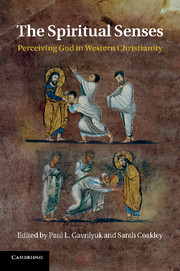Book contents
- Frontmatter
- Contents
- Contributors
- Foreword
- Abbreviations
- Introduction
- Chapter 1 Origen of Alexandria
- Chapter 2 Gregory of Nyssa
- Chapter 3 Augustine
- Chapter 4 Gregory the Great
- Chapter 5 Pseudo-Dionysius the Areopagite
- Chapter 6 Maximus the Confessor
- Chapter 7 Alexander of Hales
- Chapter 8 Thomas Gallus
- Chapter 9 Bonaventure
- Chapter 10 Thomas Aquinas
- Chapter 11 Late medieval mystics
- Chapter 12 Nicholas of Cusa
- Chapter 13 Jonathan Edwards and his Puritan predecessors
- Chapter 14 John Wesley
- Chapter 15 Karl Rahner and Hans Urs von Balthasar
- Chapter 16 Analytic philosophers of religion
- Select bibliography
- General index
- Index of select biblical references
- References
Chapter 8 - Thomas Gallus
Published online by Cambridge University Press: 05 December 2011
- Frontmatter
- Contents
- Contributors
- Foreword
- Abbreviations
- Introduction
- Chapter 1 Origen of Alexandria
- Chapter 2 Gregory of Nyssa
- Chapter 3 Augustine
- Chapter 4 Gregory the Great
- Chapter 5 Pseudo-Dionysius the Areopagite
- Chapter 6 Maximus the Confessor
- Chapter 7 Alexander of Hales
- Chapter 8 Thomas Gallus
- Chapter 9 Bonaventure
- Chapter 10 Thomas Aquinas
- Chapter 11 Late medieval mystics
- Chapter 12 Nicholas of Cusa
- Chapter 13 Jonathan Edwards and his Puritan predecessors
- Chapter 14 John Wesley
- Chapter 15 Karl Rahner and Hans Urs von Balthasar
- Chapter 16 Analytic philosophers of religion
- Select bibliography
- General index
- Index of select biblical references
- References
Summary
While in respect of all the other senses we fall below many species of animals, in respect of touch we far excel all other species in exactness of discrimination. That is why man is the most intelligent of all animals. This is confirmed by the fact that it is to differences in the organ of touch and to nothing else that the differences between man and man in respect of natural endowment are due; men whose flesh is hard are ill-endowed by nature, men whose flesh is soft, well-endowed.
AristotleIntroduction
In the unfinished opus of Bonaventure's mature career, his Collationes in Hexaëmeron, the Franciscan describes the nature of contemplation: ‘Just as fruit delights both sight and taste, yet it delights the sense of sight principally by its beauty and loveliness, and [delights] the sense of taste by its sweetness and suavity, so do these theoriae nourish the intellectus by their loveliness and the affectus by their suavity.’ That Bonaventure should invoke the language of sensation to characterize contemplative experience is not surprising. Since the work of both Karl Rahner and Hans Urs von Balthasar in the mid-twentieth century, his teaching on the spiritual senses has been well known, if also intensely debated. But two issues are noteworthy here. First, his alignment of sight with intellectus and taste with affectus, while not original, is an important feature of scholastic theorizing regarding the spiritual senses. The distinction between intellectus and affectus and the alignment of each with distinct spiritual senses imply, on the one hand, a specific anthropology with two basic and (perhaps) irreducible modalities in the soul. The fact, on the other hand, that these modalities are nonetheless united within a single, spiritual sensorium prevents too radical a divorce between them and raises the tantalizing question of their precise relationship: how discontinuous are these two ‘modes of apprehension’? Second, the object of apprehension for both intellectus and affectus is theoriae – which I intentionally avoid translating for now. What precisely does Bonaventure mean by theoriae? Does the apparent assumption that these can be both seen by the intellectus and tasted by the affectus imply that there is some continuity, overlap or direct interaction between these two modes?
Whatever the case with Bonaventure, his text recalls an earlier thirteenth-century precedent for his approach to this matter, which raises the same set of questions, namely, the writings of the Victorine Thomas Gallus (d. 1246). Though the terminology and the corresponding distinction between intellectus and affectus precede him, Gallus appears to be the first to formulate the nature of mystical contemplation thus: by aligning intellectus and affectus with a different pole of the spiritual sensorium, but orienting both towards the theoriae as a common object. The burden of what follows, however, is neither to argue for Gallus’s originality in this regard nor to claim his direct influence on Bonaventure, but to explicate Gallus’s own teaching on the spiritual senses, which teaching is, in fact, ‘essential to all that [Gallus] has to say on the knowledge which is unitive contemplation’. Gallus’s doctrine on this matter sheds crucial light on the contentious issue of his conception of the highest mode of relation to God available to created minds. That is, Gallus uses the notion of a spiritual sensorium to posit a continuum of created apprehension of God (cognitio Dei).
- Type
- Chapter
- Information
- The Spiritual SensesPerceiving God in Western Christianity, pp. 140 - 158Publisher: Cambridge University PressPrint publication year: 2011
References
- 2
- Cited by



